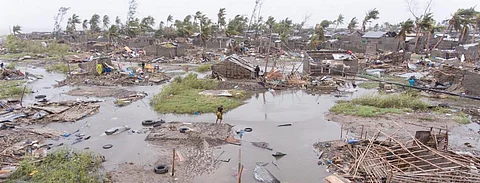

A whopping 195 per cent more Africans were affected by extreme weather events in 2019, with the continent witnessing an increase in such events as compared to 2018, according to data from the international disasters database maintained by the Centre for Research on the Epidemiology of Disasters in Brussels.
Africa recorded 56 extreme weather events this year, as compared to 45 extreme events in 2018.
Nearly 16.6 million people were affected due to natural disasters in 29 African countries, in comparison to 5.6 million people in 2018. This means close to 11 million more people were affected by seven types of disasters — drought, wildfires, floods, landslides, extreme temperature, fog and storms.
Seventy-nine per cent of those affected were in just five African countries — Zimbabwe, Kenya, Mozambique, Tanzania and Somalia.
The data also notes that 82 per cent more Africans died due to extreme weather events in 2019. About 1,865 people died in 2019, as compared to 1,024 deaths in 2018. With 996 deaths, Mozambique and Zimbabwe accounted for more than half of these deaths.
Drought and cyclones were the two leading disasters which affected most of the people in Zimbabwe, Kenya, Mozambique and Tanzania.
About 7.6 million people were affected by drought in Zimbabwe and Kenya and 3.8 million people were affected due to cyclone and storms in Tanzania and Mozambique. In 2018-19, Zimbabwe witnessed the worst drought in 40 years.
According to the United Nations, Cyclone Idai, which affected Mozambique the most along with Malawi and Zimbabwe in March 2019, was supposedly the worst disaster to strike the southern hemisphere
In terms of death toll, Mozambique ranks first primarily due to the extra-tropical storm that killed around 600 people. South Africa, where 96 people died, was among the countries with the least number of people affected. For a country which ranks as the second-largest economy in Sub-Saharan Africa, this is worrying.
Cost of damage up by 150 per cent
The continent lost around $2.4 billion, as compared to 0.8 billion in 2018. Africa is, and will be among the regions that are most vulnerable to climate change, warned a study conducted by the scientists of Met Office Hardley and Institute for Climate and Atmospheric Science, University of Leeds, based in the United Kingdom.
Meanwhile, the International Research Institute for Climate and Society at Coulmbia University in the United States has projected a very high probability of deficit rainfall during January-June 2020 in Southern African countries including Zimbabwe; and above normal rainfall during January-March 2020 in eastern equatorial Africa.
The continent should, therefore learn from the experiences of 2019 and focus on planning and actions for climate-resilience in 2020.
Nearly 195 per cent more people (as compared to 2018) were affected by extreme weather events this year. This means Africa needs to be better prepared to cope-up with extreme weather events.